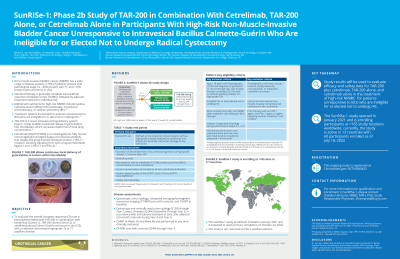Back

Industry Encore Posters
JL1034E: SunRISe-1: phase 2b study of TAR-200 in combination with cetrelimab, TAR-200 alone, or cetrelimab alone in participants with high-risk non-muscle-invasive bladder cancer unresponsive to intravesical bacillus Calmette-Guérin who are ineligible for or elected not to undergo radical cystectomy
Saturday, October 22, 2022
10:00 AM – 11:00 AM ET


Kristen Crowley, RN, MSN, APRN
Medical Science Liaison
Janssen Research & Development
Poster Presenter(s)
Background:
Treatment options are limited for patients with high-risk non-muscle-invasive bladder cancer (HR-NMIBC) unresponsive to intravesical bacillus Calmette-Guérin (BCG). TAR-200 is an intravesical drug-delivery system that provides local continuous release of gemcitabine within the bladder. This study will assess rate of complete response (CR) upon treatment with TAR-200 + systemic cetrelimab (anti–programmed cell death protein-1 antibody), TAR-200, and cetrelimab in BCG-unresponsive patients with HR-NMIBC ineligible for or who decline radical cystectomy.
Trial
Design:
SunRISe-1 (NCT04640623) is an open-label, parallel-group, multicenter phase 2b study designed to assess efficacy and safety of TAR-200 + cetrelimab, TAR-200 alone, and cetrelimab alone in participants with BCG-unresponsive HR-NMIBC. Eligible participants are aged ³18 years with Eastern Cooperative Oncology Group performance status 0-2 and histologically confirmed carcinoma in situ, with or without papillary disease (T1, high-grade Ta), and within 12 months of completing BCG. Participants (N=200) are randomized 2:1:1 to TAR-200 + CET (cohort 1, n=100), TAR-200 (cohort 2, n=50), or CET (cohort 3, n=50). In cohorts 1 and 2, TAR-200 is dosed every 3 weeks (Q3W) through Week 24, and Q12W thereafter until Week 96. Cystoscopy, urine cytology, and MRI/CT are performed at baseline. Subsequent cystoscopy and centrally read urine cytology occur Q12W through Year 2, then Q24W until end of Year 3, with additional disease assessments in Year 4 and Year 5 in accordance with institutional standards of care. Primary end point for the 3 cohorts is overall CR rate at any time point. Secondary end points include duration of response (time of first CR achieved to first evidence of recurrence, progression, or death for participants who achieve a CR), overall survival, pharmacokinetics, safety/tolerability, and patient-reported outcomes.
Participants are being enrolled at ~165 study sites in 16 countries. Enrollment initiated in January 2021.
Previously presented at ESMO Congress 2021, FPN: 719TiP, Michiel S. van der Heijden et al. - Reused with permission.
Treatment options are limited for patients with high-risk non-muscle-invasive bladder cancer (HR-NMIBC) unresponsive to intravesical bacillus Calmette-Guérin (BCG). TAR-200 is an intravesical drug-delivery system that provides local continuous release of gemcitabine within the bladder. This study will assess rate of complete response (CR) upon treatment with TAR-200 + systemic cetrelimab (anti–programmed cell death protein-1 antibody), TAR-200, and cetrelimab in BCG-unresponsive patients with HR-NMIBC ineligible for or who decline radical cystectomy.
Trial
Design:
SunRISe-1 (NCT04640623) is an open-label, parallel-group, multicenter phase 2b study designed to assess efficacy and safety of TAR-200 + cetrelimab, TAR-200 alone, and cetrelimab alone in participants with BCG-unresponsive HR-NMIBC. Eligible participants are aged ³18 years with Eastern Cooperative Oncology Group performance status 0-2 and histologically confirmed carcinoma in situ, with or without papillary disease (T1, high-grade Ta), and within 12 months of completing BCG. Participants (N=200) are randomized 2:1:1 to TAR-200 + CET (cohort 1, n=100), TAR-200 (cohort 2, n=50), or CET (cohort 3, n=50). In cohorts 1 and 2, TAR-200 is dosed every 3 weeks (Q3W) through Week 24, and Q12W thereafter until Week 96. Cystoscopy, urine cytology, and MRI/CT are performed at baseline. Subsequent cystoscopy and centrally read urine cytology occur Q12W through Year 2, then Q24W until end of Year 3, with additional disease assessments in Year 4 and Year 5 in accordance with institutional standards of care. Primary end point for the 3 cohorts is overall CR rate at any time point. Secondary end points include duration of response (time of first CR achieved to first evidence of recurrence, progression, or death for participants who achieve a CR), overall survival, pharmacokinetics, safety/tolerability, and patient-reported outcomes.
Participants are being enrolled at ~165 study sites in 16 countries. Enrollment initiated in January 2021.
Previously presented at ESMO Congress 2021, FPN: 719TiP, Michiel S. van der Heijden et al. - Reused with permission.

